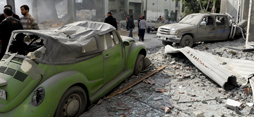

Preventing and Countering Violent Extremism
Addressing the threats related to returning Foreign Terrorist Fighters
Background
In recent times, the phenomenon of “foreign terrorist fighters” (FTFs) has expanded worldwide, especially in connection with the ongoing conflicts in Syria and Iraq. Although accurate and reliable data on FTFs are difficult to obtain, estimates suggest that more than 40.000 individuals have travelled from more than 100 countries in the world to join this conflict.
The increased number of returning FTFs, along with the increased frequency of terrorist acts worldwide, represents a challenge for international and national security.
Returning foreign terrorist fighters may have been exposed to all aspects of violent extremist ideology and lifestyle, many may have acquired combat experience and may have seen – or even participated in – atrocities. Some may have joined groups and networks that plan future attacks, in their home countries or other countries, while others may be traumatized and require medical attention. Almost all, however, will be significantly alienated and, whether convicted of a crime or not, will require comprehensive rehabilitation and reintegration in order to return to society without presenting a potentially enduring significant threat.
UNICRI has developed and fostered considerable expertise in the area of rehabilitation and reintegration of violent extremist offenders and the Institute plays a key role in supporting Member States in translating the generalized good practices identified in the Global Counter-Terrorism Forum (GCTF) Rome Memorandum, which specifically addresses the rehabilitation needs of incarcerated violent extremists, into national policies.
As member of the Counter-Terrorism Implementation Task Force (CTITF) of the United Nations, UNICRI contributes to the implementation of coordinated and coherent efforts across the United Nations System to prevent and counter terrorism. One of the critical mandates of the Institute is to support Member States in preventing and countering the appeal of terrorism and recruitment by strengthening national capacity with tailored approaches deriving from the specificity of each of the contexts in which the Institute operates.
Results in Brief
- International and regional workshops on responding to the threat of returning FTFs have been organized by UNICRI, gathering together experts, practitioners and policy makers from more than 40 countries and providing a platform for the exchange of experiences, good practices and technical information.
- Development and presentation of scenarios based on real case situations to simulate operational situations, test existing strategies and identify potential gaps and solutions in relation to the threat of returning FTFs.
- A pilot national table-top exercise on rehabilitation and reintegration of returning FTFs organized in Bosnia and Herzegovina. Through this exercise, the country was supported in the identification of risks to be addressed, capabilities to be strengthened and actions to be undertaken in successfully addressing the issue of FTFs through a comprehensive and holist approach
Outcomes
- Enhanced knowledge and capacity to prevent and respond to national and transnational security threats posed by FTFs, also within the framework of a wider counter-terrorism strategy.
- Increased awareness and understanding of weaknesses, strengths and gaps in current processes and procedures in responding to the threats posed by FTFs.
- Effective rehabilitation and reintegration strategies inside and outside the prison settings.
- Enhanced engagement, communication, collaboration and coordination among the different stakeholders involved (at national and international level) to address the issue of FTFs following a rehabilitation perspective.
- Improved national processes and procedures related to the rehabilitation of FTFs.
Process
Project activities are implemented with the final aim of supporting Member States in fulfilling their international commitments (starting from UNSCR 2178) to address the threats posed by the FTFs by enhancing knowledge and capacities. Moreover, upcoming activities will be aimed to provide technical assistance in the identification of risks to be addressed, capabilities to be strengthened and actions to be undertaken for developing and implementing a comprehensive and holistic strategy to counter the FTF’s phenomenon while maximizing the use of existing resources.
UNICRI liaised with other international organizations (mainly INTERPOL and the United Nations Counter-Terrorism Committee Executive Directorate - CTED) to ensure that various and separate efforts are incorporated into one coherent approach in order to build up and strengthen capacities for addressing the threat posed by returning FTFs.
UNICRI is working in close cooperation with selected target countries to collect and analyse relevant data and promoting the implementation of a tested methodology based on real case scenarios. Such activity facilitates the preparation of tailored action plans addressing the issue of rehabilitation and reintegration of returning FTFs, that incorporate different stakeholders’ perspective.




